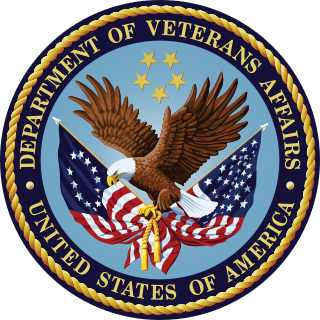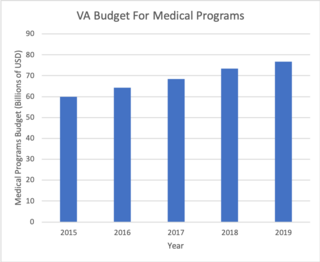Related Research Articles

The United States Department of Veterans Affairs (VA) is a Cabinet-level executive branch department of the federal government charged with providing lifelong healthcare services to eligible military veterans at the 170 VA medical centers and outpatient clinics located throughout the country. Non-healthcare benefits include disability compensation, vocational rehabilitation, education assistance, home loans, and life insurance. The VA also provides burial and memorial benefits to eligible veterans and family members at 135 national cemeteries.
The National Academy of Medicine (NAM), known as the Institute of Medicine (IoM) until 2015, is an American nonprofit, non-governmental organization. The National Academy of Medicine is a part of the National Academies of Sciences, Engineering, and Medicine, along with the National Academy of Sciences (NAS), National Academy of Engineering (NAE), and the National Research Council (NRC).

The Veterans Health Administration (VHA) is the component of the United States Department of Veterans Affairs (VA) led by the Under Secretary of Veterans Affairs for Health that implements the healthcare program of the VA through a nationalized healthcare service in the United States, providing healthcare and healthcare-adjacent services to Veterans through the administration and operation of 146 VA Medical Centers (VAMC) with integrated outpatient clinics, 772 Community Based Outpatient Clinics (CBOC), and 134 VA Community Living Centers Programs. It is the largest division in the Department, and second largest in the entire federal government, employing over 350,000 employees. All VA hospitals, clinics and medical centers are owned by and operated by the Department of Veterans Affairs as opposed to private companies, and all of the staff employed in VA hospitals are government employees. Because of this, Veterans that qualify for VHA healthcare do not pay premiums or deductibles for their healthcare but may have to make copayments depending on what procedure they are having. VHA is distinct from the U.S. Department of Defense Military Health System of which it is not a part.

Uniformed Services University of the Health Sciences (USU) is a health science university of the U.S. federal government. The primary mission of the school is to prepare graduates for service to the U.S. at home and abroad in the medical corps as medical professionals, nurses, and physicians.
The Presidential Early Career Award for Scientists and Engineers (PECASE) is the highest honor bestowed by the United States government on outstanding scientists and engineers in the early stages of their independent research careers. The White House, following recommendations from participating agencies, confers the awards annually. To be eligible for a Presidential Award, an individual must be a US citizen, national or permanent resident. Some of the winning scientists and engineers receive up to a five-year research grant.

Fort Whipple is a former United States (U.S.) Army post originally established at Del Rio Springs, north of present day Chino Valley, Arizona, and later relocated to a site in present day Prescott, Arizona.

The Under Secretary of Veterans Affairs for Health is a sub-cabinet position in the United States Department of Veterans Affairs. Formerly known as the Chief Medical Director of Veterans Health, the Undersecretary is the highest official directly responsible to the Secretary for the Veterans Health Administration, which is the largest agency within the department. Although the position is no longer required to be held by a licensed physician, senior medical professionals such as hospital administrators are typically the preferred selectee for nomination, based on both demonstrated ability in the medical profession or health care administration, and with substantial experience in Veterans healthcare or similar programs.
Journey into Medicine is a 1947 American documentary-style film. The film stars James Karen as Michael Kenneth Marshall, a young medical student who goes through medical training at Columbia and Cornell. During his internship in pediatrics, Marshall loses one of his patients, a young girl to diphtheria. This case inspires him to enroll in the Johns Hopkins School of Public Health and pursue a career in public health. While studying at Johns Hopkins, Marshall helps battle an outbreak of diphtheria in Baltimore, which confirms to him his chosen vocation.

The Veterans Health Information Systems and Technology Architecture (VISTA) is a health information system deployed across all veteran care sites in the United States. VISTA provides clinical, administrative, and financial functions for all of the 1700+ hospitals and clinics of the Veterans Health Administration VISTA consists of 180 clinical, financial, and administrative applications integrated within a single transactional database (see figure 1).

Gulf War syndrome or Gulf War illness is a chronic and multi-symptomatic disorder affecting military veterans of both sides of the 1990–1991 Persian Gulf War. A wide range of acute and chronic symptoms have been linked to it, including fatigue, muscle pain, cognitive problems, insomnia, rashes and diarrhea. Approximately 250,000 of the 697,000 U.S. veterans who served in the 1991 Gulf War have enduring chronic multi-symptom illness, a condition with serious consequences.
The American College of Surgeons National Surgical Quality Improvement Program was started in the American Veterans Health Administration (VHA). In the mid-1980s the VHA was criticized for their high operative mortality. To that end, Congress passed Public Law 99-166 in December 1985 which mandated the VHA to report their outcomes in comparison to national averages and the information must be risk-adjusted to account for the severity of illness of the VHA surgical patient population. In 1991 the National VA Surgical Risk Study (NVASRS) began in 44 Veteran's Administration Medical Centers. By 31 December 1993, there was information for 500,000 non-cardiac surgical procedures. In 1994 NVASRS was expanded to all 128 HVA hospitals that performed the surgery. The name was then changed to the National Surgical Quality Improvement Program.

The Medical College of Virginia/Virginia Commonwealth University School of Medicine is the medical school of Virginia Commonwealth University, a public research university in Richmond, Virginia. It is the largest and oldest continuously operating medical school in Virginia. The school traces its beginnings to the 1838 opening of the medical department of Hampden–Sydney College, which in 1854 became an independent institution known as the Medical College of Virginia (MCV). In 1968, MCV joined with the Richmond Professional Institute to form Virginia Commonwealth University. The School of Medicine is one of five schools within the VCU Medical Center and Children's Hospital of Richmond at VCU.

The United States has compensated military veterans for service-related injuries since the Revolutionary War, with the current indemnity model established near the end of World War I. The Department of Veterans Affairs (VA) began to provide disability benefits for post-traumatic stress disorder (PTSD) in the 1980s after the diagnosis became part of official psychiatric nosology.
Joel Kupersmith, M.D., an American physician, is the former dean of the Texas Tech University School of Medicine, and head of the Office of Research and Development of the Department of Veterans Affairs. He is the former Director, Veterans Initiatives and Professor of Medicine at Georgetown University.
Harvey John Tompkins, M.D. (1906–1983) was an American physician, a psychiatrist, whose professional life was in public service.
National Quality Forum (NQF) is a United States-based non-profit membership organization that promotes patient protections and healthcare quality through measurement and public reporting. It was established in 1999 based on recommendations by the President's Advisory Commission on Consumer Protection and Quality in the Health Care Industry. NQF’s membership comprises over 400 organizations, representing consumers, health plans, medical professionals, employers, government and other public health agencies, pharmaceutical and medical device companies, and other quality improvement organizations. NQF has helped develop guidelines on palliative care.

The Veterans' Access to Care through Choice, Accountability, and Transparency Act of 2014, also known as the Veterans Choice Act, is a United States public law that is intended to address the ongoing Veterans Health Administration scandal of 2014. The law expanded the number of options veterans have for receiving care and granted the United States Secretary of Veterans Affairs more power to fire senior executives. The Veterans Health Administration scandal of 2014 began with the discovery that there was on-going systematic lying by the Veterans Health Administration about the wait times veterans experienced waiting to be seen by doctors. By June 5, 2014, Veterans Affairs internal investigations had identified a total of 35 veterans who had died while waiting for care in the Phoenix VHA system. Another audit determined that "more than 57,000 veterans waited at least 90 days to see a doctor, while another 63,000 over the last decade never received an initial appointment."
The Dr. Nathan Davis Awards are presented annually by the American Medical Association (AMA) and awarded to elected and career public servants in national, state, and local governments for outstanding government service. These awards are named for the founder of the American Medical Association, Nathan Smith Davis.
The United States Veterans Health Administration (VHA) has a lesbian, gay, bisexual and transgender (LGBT) Program through the Office of Patient Care Services. However, VHA does not currently collect data on veteran’s sexual orientation or gender identity. There are estimated to be more than one million LGBT Americans who are military veterans. If LGBT veterans use VHA at the same rate as non-LGBT veterans, there could be more than 250,000 LGBT veterans served by VHA. Using diagnostic codes in medical record data, Blosnich and colleagues found that the prevalence of transgender veterans in VHA (22.9/100,000) is five times higher than reported prevalence of transgender-related diagnoses in the general population (4.3/100,000). Brown and Jones identified 5,135 transgender veterans receiving care in VHA using a broader set of diagnostic codes. Brown also notes that this methodology fails to identify transgender veterans who have not disclosed their gender identity to providers, those who don’t meet criteria for a diagnosis, or veterans who get their transition-related care outside of the VHA.
Learning health systems (LHS) are health and healthcare systems in which knowledge generation processes are embedded in daily practice to improve individual and population health. At its most fundamental level, a learning health system applies a conceptual approach wherein science, informatics, incentives, and culture are aligned to support continuous improvement, innovation, and equity, and seamlessly embed knowledge and best practices into care delivery
References
- ↑ FORTUNE: How the VA healed itself - May 15, 2006
- ↑ Kenneth W. Kizer, M.D., M.P.H. (Director's bio at Institute for Population Health Improvement, UC Davis)
- ↑ Incorporated, Prime. "National Academy of Public Administration". National Academy of Public Administration. Retrieved 2023-04-10.